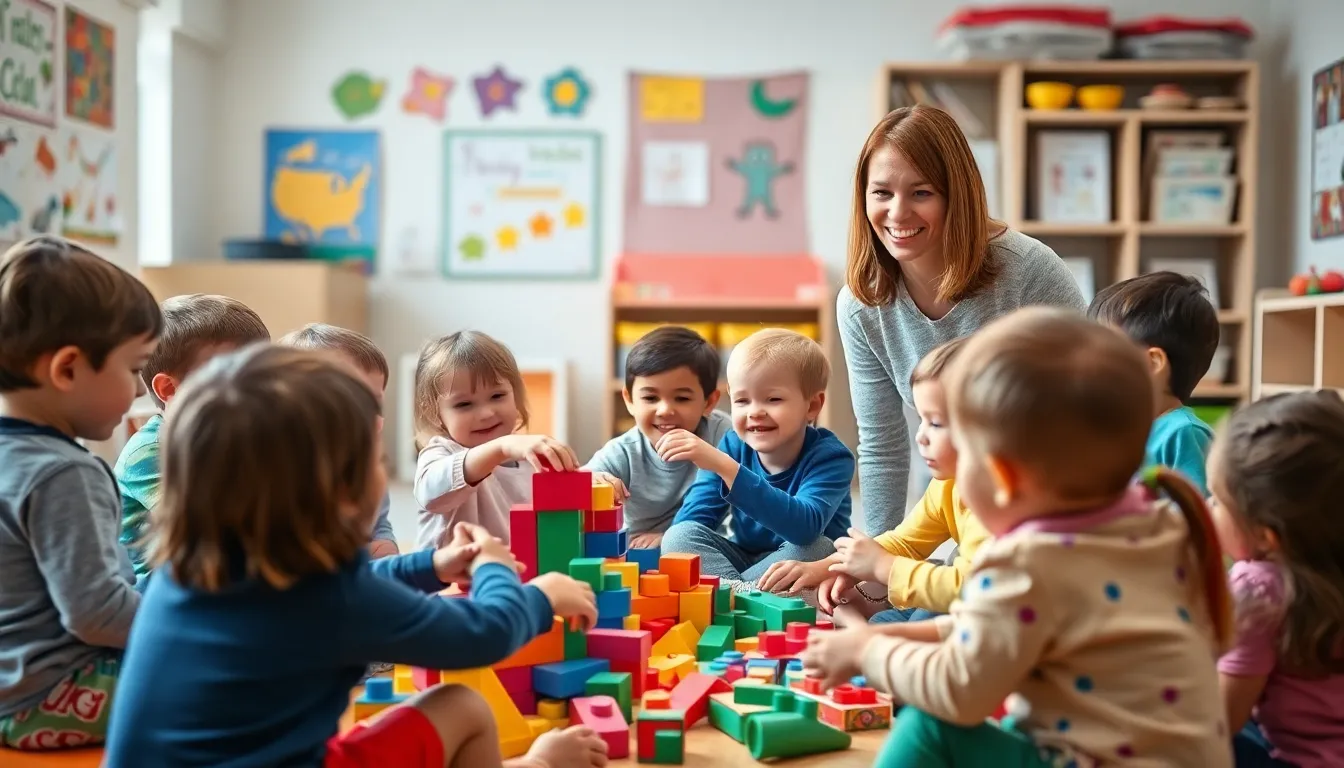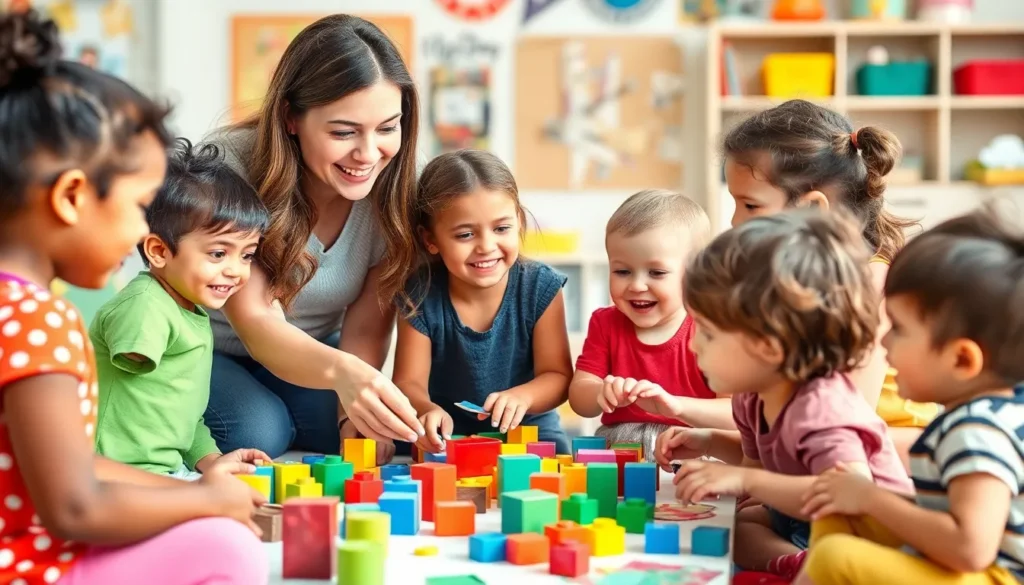Table of Contents
ToggleIn today’s fast-paced world, the foundation of a child’s education begins long before they step into a traditional classroom. A well-structured preschool curriculum plays a crucial role in shaping young minds, fostering creativity, and developing essential social skills. Parents and educators alike understand that these early years are vital for cognitive and emotional growth.
An effective preschool curriculum goes beyond basic academics. It integrates play-based learning, hands-on activities, and social interaction to create a holistic approach that nurtures the whole child. By focusing on key developmental areas, such as language, motor skills, and emotional intelligence, preschool programs set the stage for lifelong learning and success.
Overview of Preschool Curriculum
A preschool curriculum consists of structured educational activities designed for children ages three to five. This curriculum often includes various components essential for a child’s development, such as:
- Academic Skills: Experiences that introduce letters, numbers, shapes, and colors enhance cognitive development. Children engage in counting, letter recognition, and simple problem-solving.
- Play-based Learning: Activities centered around play facilitate natural learning. Through imaginative play, children develop creativity, critical thinking, and social skills.
- Social Interaction: Group activities promote teamwork and communication. Engaging with peers helps children learn to share, take turns, and resolve conflicts.
- Motor Skills Development: Fine and gross motor skill activities improve physical coordination. Art projects, outdoor play, and sensory exploration support this critical area of development.
- Emotional Growth: Curriculum components focusing on emotional intelligence help children understand their feelings. Activities that promote empathy and self-regulation contribute to emotional maturity.
- Language Development: Early exposure to rich language experiences enhances vocabulary and listening skills. Storytime, songs, and interactive discussions expand linguistic abilities.
Preschool curricula incorporate diverse teaching strategies to accommodate different learning styles. Each child’s unique interests and needs inform the curriculum’s adaptability, ensuring an inclusive environment tailored to promote holistic growth.
Key Components of Preschool Curriculum

A comprehensive preschool curriculum encompasses essential developmental areas. These components work together to foster a child’s overall growth and readiness for future learning experiences.
Social Development
Social development involves forming relationships and interacting with peers. Activities that encourage sharing, cooperation, and conflict resolution enhance social skills. Group projects, games, and role-playing scenarios allow children to practice empathy and understand diverse perspectives. Structured circle time discussions also promote effective communication, helping children express their thoughts and feelings.
Cognitive Development
Cognitive development incorporates critical thinking and problem-solving skills. Preschoolers engage in activities like counting, sorting, and pattern recognition to enhance their understanding of numbers and shapes. Additionally, storytelling and interactive reading sessions improve language skills while sparking creativity. Mindfulness and inquiry-based learning ignite curiosity, motivating children to explore their surroundings and discover new concepts.
Physical Development
Physical development focuses on fine and gross motor skills. Activities such as drawing, cutting, and sculpting promote hand-eye coordination and dexterity. Outdoor play, including running and climbing, builds strength and agility. Integrating movement into learning experiences, like dance and rhythm games, fosters physical fitness while making learning enjoyable. These activities support not only physical health but also cognitive engagement through active participation.
Emotional Development
Emotional development emphasizes self-awareness and regulation. Activities that encourage children to express their feelings and recognize emotions in others nurture emotional intelligence. Role-playing through storytelling helps children navigate social scenarios, fostering resilience and coping strategies. Mindfulness exercises and calming techniques also contribute to emotional regulation, helping children manage stress and build positive relationships.
Different Approaches to Preschool Curriculum
Preschool curricula utilize various approaches to facilitate children’s learning and development. Below are three widely recognized methods.
Montessori Method
The Montessori Method emphasizes self-directed, hands-on learning. In this approach, children choose activities from specially designed learning materials. Teachers act as guides rather than traditional instructors. Key components include:
- Child-led Learning: Children explore subjects at their own pace, fostering independence and confidence.
- Prepared Environment: Learning spaces are organized to encourage exploration and access to educational resources.
- Mixed Age Groups: Children of different ages learn together, promoting peer learning and mentorship.
Reggio Emilia Approach
The Reggio Emilia Approach prioritizes creativity and self-expression through exploration. Originating in Italy, this approach views children as capable and resilient. Essential aspects include:
- Project-based Learning: Children engage in long-term projects that encourage inquiry and collaboration.
- Documentation: Teachers document children’s experiences through photographs and notes to track progress and learning.
- Community Involvement: Parents and community members are integral to the learning process, fostering a strong support system.
HighScope Curriculum
- Plan-Do-Review Process: Children plan activities, carry them out, and reflect on their experiences, promoting critical thinking.
- Key Developmental Indicators: The curriculum includes specific goals for children’s development across various domains.
- Classroom Routines: Consistent daily routines help children understand structure while allowing for flexibility in choices.
Importance of Preschool Curriculum
A structured preschool curriculum plays a critical role in early childhood education. It lays the groundwork for various developmental areas essential for a child’s future success.
Benefits for Children
Preschool curriculum offers multiple benefits for children, including:
- Cognitive Development: Engaging activities, such as counting and letter recognition, stimulate critical thinking and problem-solving abilities.
- Social Skills: Group activities promote communication, cooperation, and conflict resolution, allowing children to build relationships and navigate social dynamics.
- Motor Skills: Art projects and outdoor activities enhance fine and gross motor skills, contributing to overall physical development.
- Emotional Growth: Activities focusing on empathy and self-regulation foster emotional intelligence, helping children understand and express their feelings effectively.
- Play-Based Learning: Integrating play encourages creativity and imagination, making learning more enjoyable and effective.
Impact on Future Learning
The impact of an effective preschool curriculum extends beyond early years, influencing future educational experiences:
- Foundation for Academics: Children with a solid preschool background tend to perform better in later grades, particularly in reading and math.
- Lifelong Learning Skills: Early exposure to problem-solving and critical thinking prepares children for complex tasks in later academic settings.
- Social Readiness: Skills developed in preschool, such as teamwork and communication, enhance interactions in school and eventually in the workplace.
- Emotional Resilience: Early emotional intelligence contributes to better coping strategies, aiding children in managing stress and adapting to challenges throughout their education.
A well-designed preschool curriculum serves as a vital stepping stone, facilitating a smoother transition to formal schooling and encouraging overall growth in children.
A well-structured preschool curriculum plays a vital role in shaping a child’s early educational journey. By blending academic learning with play-based experiences and social interactions, it fosters comprehensive development. This approach not only enhances cognitive and motor skills but also nurtures emotional intelligence and social readiness.
Each child’s unique needs and interests are addressed through diverse teaching strategies, ensuring an inclusive environment. As children engage in various activities, they build essential skills that pave the way for future success. The right preschool curriculum lays the foundation for lifelong learning, equipping children with the tools they need to thrive in school and beyond.





